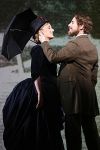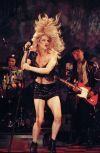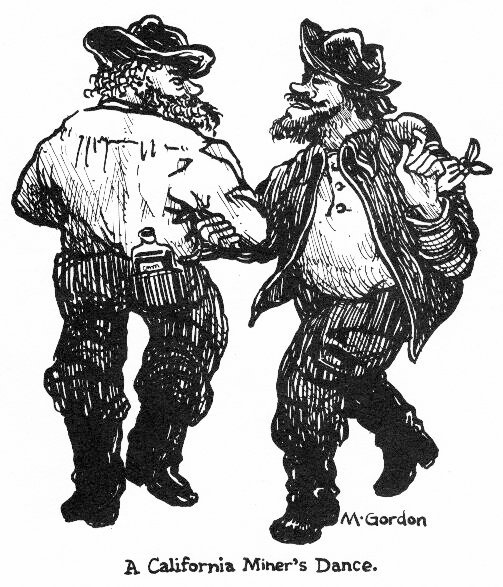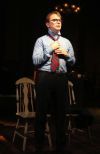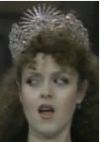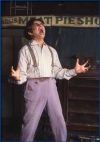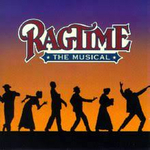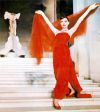Writing the Book for a Musical: A Misunderstood Art
neonlightsxo
Broadway Legend Joined: 7/29/08
#1Writing the Book for a Musical: A Misunderstood Art
Posted: 5/10/16 at 1:26pm
Very glad they called Isherwood out on this. Thanks, Dramatists Guild.
http://www.nytimes.com/2016/05/11/opinion/writing-the-book-for-a-musical-a-misunderstood-art.html?ref=opinion
#2Writing the Book for a Musical: A Misunderstood Art
Posted: 5/10/16 at 1:31pm
This is great. The Drama Desk fiasco was bad enough, but Isherwood's comment was just embarrassing.
#3Writing the Book for a Musical: A Misunderstood Art
Posted: 5/10/16 at 1:39pm
This is excellent. As a grad student/librettist myself, this dismissal of book writers has been quite disheartening to watch, and it's lovely to see this misconception get called out so calmly and thoroughly.
#4Writing the Book for a Musical: A Misunderstood Art
Posted: 5/10/16 at 1:57pm
Isherwood continues to disgust me more and more. This question gets raised almost regularly from people on this board who don't understand what a book writer actually does. It's irritating, but we can't expect everyone here to be an expert on this topic. From a NYT theatre critic, however, it's just plain disgraceful.
Updated On: 5/10/16 at 01:57 PM#5Writing the Book for a Musical: A Misunderstood Art
Posted: 5/10/16 at 3:29pm
Very very well written, Dramatists Guild. I hope they shove the explanation more and more (a gaff at Tonys would be a good start). It's sad that it's even required, but I don't want Best Book category to go away like they did with Sound Design.
#6Writing the Book for a Musical: A Misunderstood Art
Posted: 5/10/16 at 8:55pm
Don't critics feel any need to educate themselves on the art form they criticize? Whether they should read source material in advance is debatable. (Myself I think doing so tends to invite them to write their own adaptation in their heads and then critique on the basis of that imaginary work.)
But I see no excuse for not having read something as valuable as SONDHEIM & CO., which explains the book writer's job quite well.
#7Writing the Book for a Musical: A Misunderstood Art
Posted: 5/10/16 at 9:22pm
Isherwood is always finding new ways to reveal his ignorance of the form and the field and its value.
Love whenever Doug Wright goes all letter-to-the-editor.
#8Writing the Book for a Musical: A Misunderstood Art
Posted: 5/10/16 at 9:27pm
Would the NEW YORK TIMES tolerate a music critic who didn't know the difference between Mozart and John Cage? Or an art critic who didn't understand why Realists broke Neo-Classical "rules".
I doubt it.
Plum
Broadway Legend Joined: 3/4/04
#9Writing the Book for a Musical: A Misunderstood Art
Posted: 5/10/16 at 9:54pmThey tolerate a lot of crap in their television criticism, so this isn't without precedent, but lordy this is disgraceful.
#10Writing the Book for a Musical: A Misunderstood Art
Posted: 5/10/16 at 10:09pm
It's funny and sad because it's one of those roles that never seem to get any credit or praise, only blame if the show isn't working. (Sound Design is another that comes to mind).
Broadway Legend Joined: 12/31/69
#11Writing the Book for a Musical: A Misunderstood Art
Posted: 5/10/16 at 10:13pm
I feel this NYT article didn't do a great job of explaining what exactly it is that book writers do. That they "provide the blueprint" or "protect the story" doesn't really tell me much. I'm still left wondering what exactly they do to make those things happen, especially in the case of a sung through. Can anyone shed more light on this?
#12Writing the Book for a Musical: A Misunderstood Art
Posted: 5/10/16 at 10:25pm
I mean, every show will ultimately have a different process, so it's not a one-size-fits-all kind of scenario. But book writers provide a general blueprint for the story and how it progresses, allowing the composer to find the best place to insert a song, or in the case of a sung-through musical, a particular moment for a character.
A great example is James Lapine with Sunday in the Park with George. Sondheim asked Lapine to give him a monologue for Dot that explains what would be running through her head as she stands for George at the top of the show. The monologue is stream of consciousness and isn't actually in the show, but from that Sondheim was able to write the opening number. It's also a great example of why book writers are often ignored- their contributions are essential, but the audience often doesn't realize it because it isn't immediately apparent in the way a song might be.
#13Writing the Book for a Musical: A Misunderstood Art
Posted: 5/10/16 at 10:50pm
I'd be curious to know more about the process of writing a musical, with regards to the book, as it can seem like a bit of a chicken/egg situation, but I suppose the book is the egg from which the chicken hatches. How many musicals have a fully written draft script that is then adapted to musical form, where necessary or decided? In my early draft script for Merrily We Roll Along, the entire Franklin Shepard Inc song is missing, and in its place is a dialogue scene that covers the same ground.
#14Writing the Book for a Musical: A Misunderstood Art
Posted: 5/10/16 at 11:01pm
Sondheim has said in the past that he often gets too much credit for his work (e.g., when people speak favourably of the complex characters he has written etc.). He has tried to make it clear that he didn't actually write any of the characters - his collaborators do.
#15Writing the Book for a Musical: A Misunderstood Art
Posted: 5/10/16 at 11:02pm
I'm afraid I must slowly and awkwardly raise my hand here and also say that I had always thought that although they work closely with the composer/lyricist on the show's structure, technically the book writer's main duty is writing the dialogue between the songs. And let's be honest, until sung-through musicals became more common, that was essentially their role.
Can anyone name a sung-through musical in which the credited book writer was neither composer nor lyricist? There are I imagine few if any, because in sung-through musicals, the composer and lyricist take on the structural/storytelling duties a book writer would normally have.
So frankly, I'm with Isherwood on this one. If the Dramatists Guild would like to "update" the definition of a book writer due to the popularity of sung-through musicals, that's fine. But by the traditional definition, Hamilton has no book, because it's sung-through.
ahhrealmonsters
Broadway Legend Joined: 9/11/10
#16Writing the Book for a Musical: A Misunderstood Art
Posted: 5/10/16 at 11:12pm
The Distinctive Baritone said: "Hamilton has no book, because it's sung-through."
This is incorrect. The librettist/bookwriter creates the structure of the musical. The book contains the treatment/outline, the characters, and sometimes song placement. Without the book, Hamilton would be a bunch of songs without any plot, characters, through-line, etc.
#17Writing the Book for a Musical: A Misunderstood Art
Posted: 5/10/16 at 11:20pm
The Distinctive Baritone said: "I'm afraid I must slowly and awkwardly raise my hand here and also say that I had always thought that although they work closely with the composer/lyricist on the show's structure, technically the book writer's main duty is writing the dialogue between the songs. And let's be honest, until sung-through musicals became more common, that was essentially their role.
Can anyone name a sung-through musical in which the credited book writer was neither composer nor lyricist? There are I imagine few if any, because in sung-through musicals, the composer and lyricist take on the structural/storytelling duties a book writer would normally have.
So frankly, I'm with Isherwood in this one. If the Dramatists Guild would like to "update" the definition of a book writer due to the popularity of sung-through musicals, that's fine. But by the traditional definition, Hamilton has no book, because it's sung-through."
I'm very confused by your logic. I don't see the rise of sung-through musicals as relevant here, except in the sense that Hamilton has been the catalyst for this discussion. Yes, the lyricist and book writer of sung-through musicals are often the same person, but that does not mean they aren't doing both jobs. The same could be said for the music and lyrics of any musical. And yes, the book writer works closely with the composer and lyricist to structure the show, but how does that mean that it's suddenly not their job to structure the show? It's a collaboration. It goes the other way too.
What exactly do you mean when you say "traditional definition"? How can you claim that the TRADITIONAL definition of a book is only the spoken words, when any IBDB page of a sung-through musical, any member of the Tony committee, and any person who has written a musical will ALL tell you the exact opposite?
#18Writing the Book for a Musical: A Misunderstood Art
Posted: 5/10/16 at 11:23pm
Great article. The role of bookwriter is one of the more thankless 'creative' roles. Like others have said, if the show is good, the bookwriter is virtually forgotten while people heap praise on the songs as well as the composer/lyricist. If the show is bad then the bookwriter gets blamed.
#19Writing the Book for a Musical: A Misunderstood Art
Posted: 5/10/16 at 11:24pm
Did you read the letter to the editor, Baritone? The book of Hamilton is substantive regardless of there being little dialogue (it is by no means sung-through) and the plot's dramatic structure is cohesive and meaningful. If there was no book it would be a revue (or a mixtape, as was the original intent).
As for sung-through musicals with a separate librettist: Falsettos.
#20Writing the Book for a Musical: A Misunderstood Art
Posted: 5/11/16 at 12:16am
Man, it's so easy to rile some of you up, even with a politely expressed opposing view.
If you read my post a bit more carefully you'll see that I am merely pointing out something that is confusing for many people - even theatre professionals - given the many forms of musical theatre that have stemmed from the traditional book musical.
In the traditional sense, Hamilton has no book. But in the expanded and updated definition of the word, it does. That's all I'm saying.
#21Writing the Book for a Musical: A Misunderstood Art
Posted: 5/11/16 at 12:29am
On the contrary, Distinctive Baritone. No one is riled up, but merely pointing out the flaw in your logic. You say in "a traditional sense" Hamilton has no book,. Do you mean that because there is very little dialogue in the scene work? Because in a traditional sense, a book writer would be primarily responsible for the dialogue? Even in a traditional sense, that is not the case.
I'll give an example. Carousel opens with no spoken dialogue. It is all music, which we know to be "The Carousel Waltz." And yet, in those seven and a half minutes of music, a great deal of story has been told without a single line being uttered. Taking those 7+ minutes of pure music and turning it into an opening scene was purely the idea of Oscar Hammerstein and it was he who shaped the number dramatically so that we knew exactly how much story was being told and at what points in the music it would be told. But, again, there is no dialogue. Only music. So does Hammerstein the librettist not get to take credit for the success of that number?
#22Writing the Book for a Musical: A Misunderstood Art
Posted: 5/11/16 at 12:48am
Good example with Carousel, although I was never denying the fact that book writers make those kinds of contributions, merely pointing out that many people aren't aware of them, since in such cases it's most likely a collaboration with the composer/lyricist and the nature of the book writer's contribution may not be readily apparent. "Who came up with what" can be a mystery when it's an entirely musical piece. Obviously, with Hamilton, Lin-Manuel Miranda came up with all of it (with the help of Ron Chernow).
Anyway, I am all for the Dramatists Guild clarifying what book writers do in sung-through musicals and demanding an updated definition. But the definition has clearly evolved from what it once was, and I don't think it's fair to dogpile on Isherwood for going by the old definition, since many people still do. Not for long I guess though.
Broadway Forever2
Leading Actor Joined: 3/7/16
#23Writing the Book for a Musical: A Misunderstood Art
Posted: 5/11/16 at 1:04am
Lmao why are people acting brand new though? Cats, Les Miserables, Rent, Sweeney Todd and Evita are ALL sung through musicals and won best book. It's not a "new definition" It's always been like this.... Why is Isherwood trying to act surprised that Hamilton was nominated.
#24Writing the Book for a Musical: A Misunderstood Art
Posted: 5/11/16 at 1:06am
True, true...I guess Isherwood and I are just old souls...
Sweeney Todd actually does have a fair amount of spoken dialogue though, and to further complicate matters it's based on another play...lets just say the book writer's job varies from musical to musical and leave it at that!
Broadway Forever2
Leading Actor Joined: 3/7/16
#25Writing the Book for a Musical: A Misunderstood Art
Posted: 5/11/16 at 1:14am
to me it comes off as him discounting the nomination or saying they only voted for it because it's "Hamilton" when it's always been like that. Anyway it will most likely win. It's not like there's much competition in best book.


